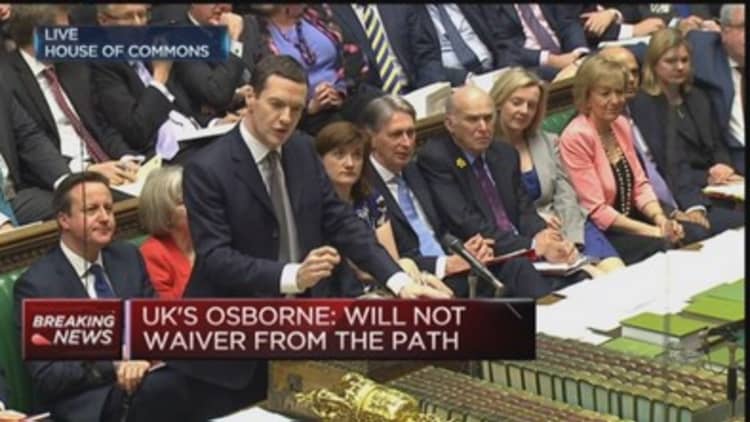
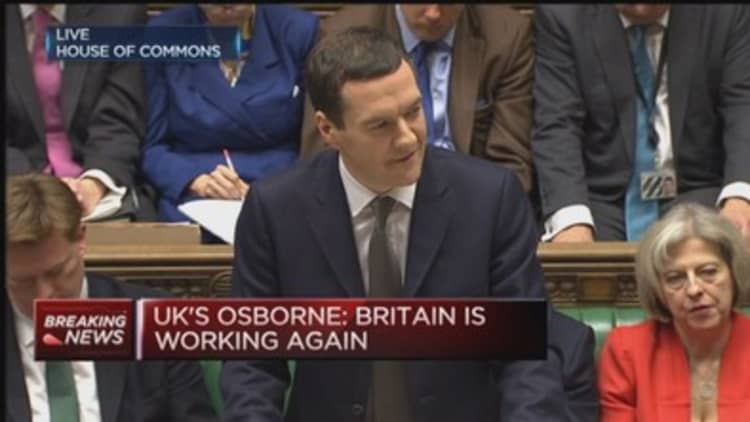
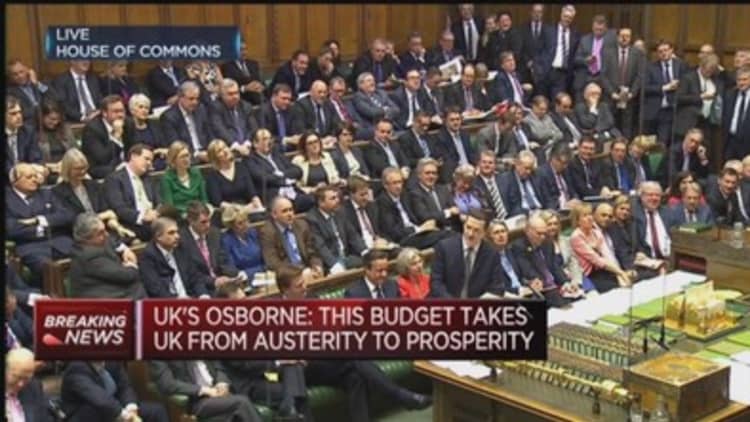
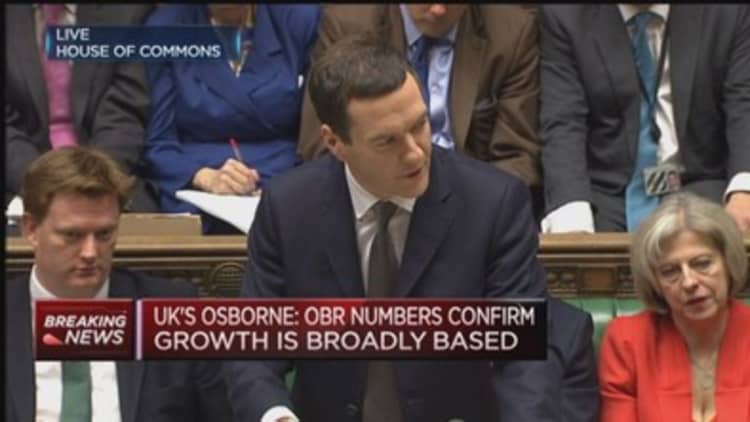
The U.K.'s Chancellor of the Exchequer George Osborne outlined plans to soften his government's stance on austerity Wednesday - just in time for May's election.
In his annual Budget speech, Osborne stated that the government's surplus forecast for 2019-2020, which it hopes will be the first year the U.K is in the black since 2001, has been lowered from 1 percent of gross domestic product to 0.3 percent. This gives Osborne more room to soften of its less popular policies.
"This is a budget that takes Britain one more big step on the road from austerity to prosperity," Osborne said.
Ed Miliband, the leader of the opposition Labour Party, attacked the budget as "a budget people won't believe". He argued that Osborne "gives with one hand but takes far more away with the other", and claimed real wages were down £1,600 in the five years since the government came to power.
This Budget is particularly important as it is just seven weeks before the most difficult-to-call U.K. election for close-to a century.
Osborne kicked off pledging to cut the deficit and warning of the danger of a Greek exit from the euro zone. However, he failed to flag any planned cuts or rises to public services spending.
The Chancellor also defended the U.K.'s participation in the China-backed Asian Infrastructure Investment Bank, a potential rival to the World Bank, which has been criticized by the U.S.
There were a number of announcements which had a distinct pre-election flavor: raising the personal tax-free allowance to £11,000 per year by 2017; cancelling a planned fuel duty increase; reducing the tax on beer.
Pensioners, those who own £1 million plus properties, farmers and churches (all appealing to core Conservative Party voters) also got a boost.
In the five years since Osborne's Conservative Party entered a coalition government with the Liberal Democrats, the U.K. has undergone one of the strongest economic recoveries in Europe -- but there are still many who doubt the strength of that revival and whether everyone in the U.K. is benefiting.
"We've got a great big deficit, debts at levels that are historically remarkable—but since we've had quantitative easing and low interest rates, somehow that seems not to matter," Jon Moulton, chairman of private equity firm Better Capital, told CNBC.
An end to austerity?
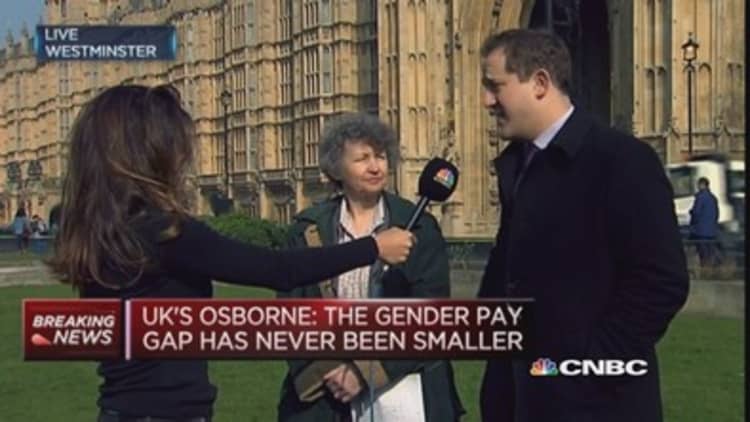
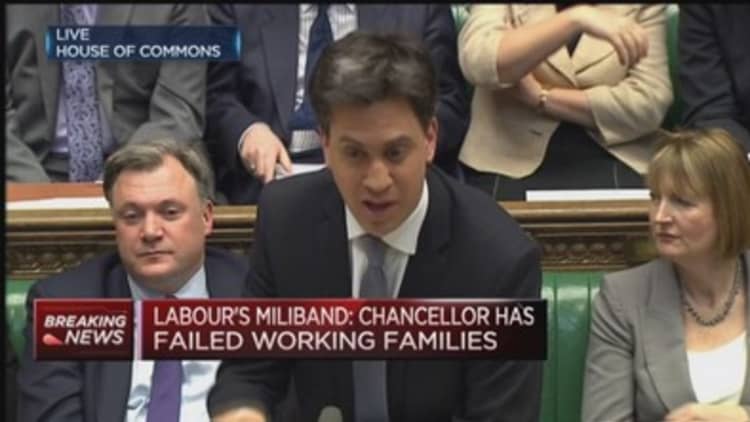
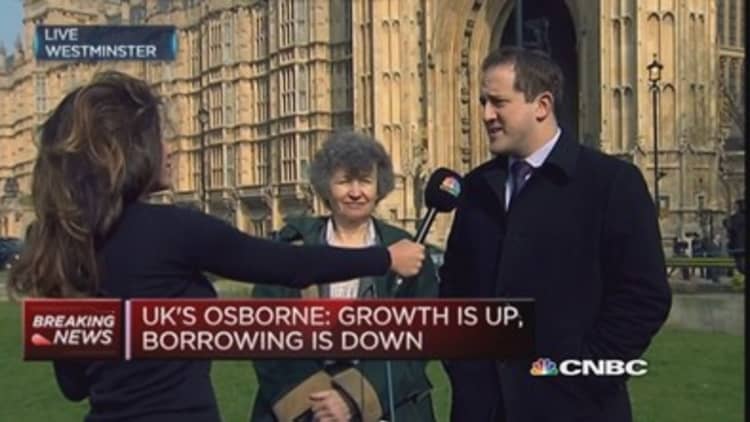
The U.K. government's borrowing in 2015—Osborne's key focus for the past five years—came in lower than earlier forecasts, at £75.3 billion. He also announced that the government aiming for a lower budget surplus by the end of the decade than it was just a few months ago - £7 billion pounds in 2019/20, much lower than the £23 billion target in December.
However, lower-than-expected borrowing doesn't mean that the Chancellor will want to spend the extra cash on giveaways. After all, it doesn't mean that there is more actual money, just that borrowing is less than previously forecast.
Plunging in global oil prices and falling inflation have given Osborne favorable headwinds.
Help to buy
The Chancellor announced that people trying to get on the housing ladder will get a tax break in their attempts to save for the deposit to buy a property.
This will involve the creation of a "Help-to-Buy ISA" where first time buyers who save up to £200 a month towards their house purchase will get a 25 percent boost from the government. However, critics warned that this addresses the demand rather than supply side of the U.K. housing market.
Forecast boosts
Osborne also revealed more optimistic forecasts by the independent government forecaster, the Office for Budget Responsibility, which now expects the U.K.'s gross domestic product (GDP) to expand by 2.3 percent next year, up from the 2.2 percent forecast in December. However, these revisions are not as high as some economists had hoped for - and the figure for 2014 was revised down.
It came after the Organisation for Economic Co-operation and Development (OECD) lowered its forecast for U.K. growth in 2015 by 0.1 percentage point to 2.6 percent on Wednesday morning.
Bank asset sales
Osborne has unveiled a £22 billion ($32 billion) sale of U.K. bank assets owned by the government.
The government is aiming to sell off £13 billion worth of mortgage assets it took over from Northern Rock and Bradford & Bingley, two U.K. lenders which collapsed during the credit crisis, and £9 billion worth of its stake in Lloyds Banking Group.
The levy imposed on banks will be raised to 0.21 percent - which sent U.K. bank stocks lower in afternoon trading.
Oiling the wheels
The U.K.'s North Sea oil and gas industry got a boost from a cut to oil taxes and the creation of an investment allowance, in an effort to keep investment going despite the plummeting oil price.
A supplementary tax charge on oil companies will be cut from 30 to 20 percent.
- By CNBC's Catherine Boyle




